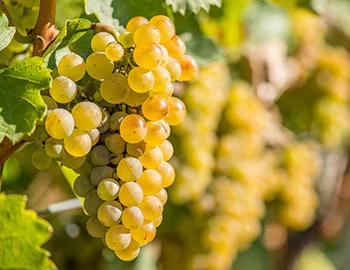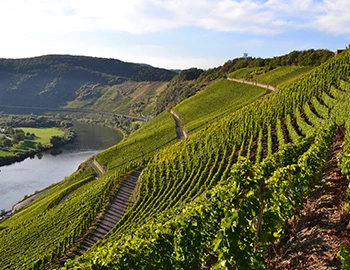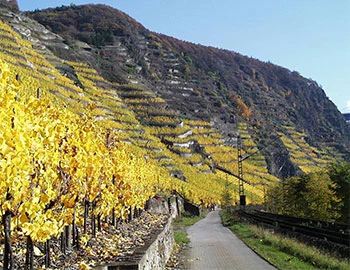Schieferterrassen Riesling 2020
QbA Mosel-Saar-Ruwer, Heymann-Löwenstein, 750 ml

| Grape variety: | Riesling |
| Producer: | Heymann-Löwenstein / Fam. Löwenstein |
| Origin: | Germany / Mosel / Untermosel |
Description
Pale golden yellow with bright green tinge. Nose of quince, banana, lychee and pear with a hint of apricot. On palate the wine is full and lively with a fine balance between acidity and fruit. With moderate complexity, it remains a beautiful expression of Riesling's elegance from a master of avant-garde winemaking in Moselle.
Attributes
| Origin: | Germany / Mosel / Untermosel |
| Grape variety: | Riesling |
| Label: | Vegan |
| Ripening potential: | 1 to 8 years |
| Drinking temperature: | 10 to 12 °C |
| Food Pairing: | Fruit tart, Hot Asian dishes, Spicy hard cheese |
| Vinification: | fermentation with grapes' own yeast, long must fermentation, soft pressing |
| Harvest: | hand-picking with simultaneous grape sel |
| Maturation: | in steel tank |
| Bottling: | filtration |
| Volume: | 13.0 % |
| Note: | Contains sulphites |
Heymann-Löwenstein / Fam. Löwenstein
Riesling
The cold-weather king
The Riesling is the flagship of the German wine industry. It grows from north to south in all growing areas. It is also comfortable in the neighbouring Alsace region and in Austria. Its specialty is being vinified to a variety of degrees of sweetness, from bone-dry wines to ice wine. Moreover, thanks to its spirited acidity, it ages better than many reds. The typical Riesling smells of citrus, peach and apricot, shows hints of flint, and with maturity develops an idiosyncratic petrol note. It reflects its terroir like hardly any other white variety. Thus, it often gets fuller and more aromatic in Austria than in Germany. In Alsace, in turn, it has a particular mineral taste. Riesling is a wonderful culinary companion. It fits well not only with fish and shellfish, but also takes the heaviness from hearty meals. And with a fine sweetness and acidity balance, it works wonders for Asian cuisine.

Untermosel
Lower Mosel: the finesse of steep slopes
The Lower Mosel comprises the final 100-kilometre section of the river between the village of Pünderich and the site near Koblenz, where the Mosel flows into the Rhine. This sub-region is often known as Terrace Mosel, where steep slope viticulture is reflected in its most impressive form. In the micro-terraces that often sit at dizzying heights over the river, Riesling demonstrates its complete expressive powers.

Mosel
Mosel: in Riesling territory
In the valleys of the Mosel, Saar and Ruwer, the white Riesling variety fully fulfils its potential. Mosel is not only the German growing area with the highest proportion of Riesling; the largest number of steep slopes are also found here. Around 40 percent of the vineyards are situated on gradients of greater than 30 percent, and must be cultivated with labour-intensive manual work. On the slate soils, Riesling presents its entire inimitable range, from dry to semidry to noble sweet..

Germany
Germany – Into the elite the hard way
Sitting in the heart of Europe, the hilly, lake-dotted landscape of Germany provides ideal, fertile soil for the most diverse vine varieties. From Albalonga to Zweigelt, over 140 different grape varieties are grown on about 100,000 acres, cared for by nearly 50,000 vintners. Most of these vintners are young, modern, internationally trained, inquisitive and urbane. It is hardly surprising, then, that German wine has a good reputation well beyond the country's borders.




